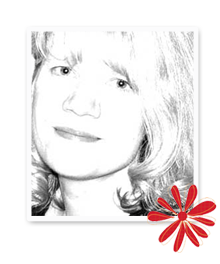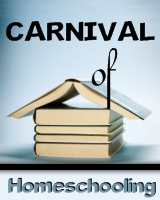Math is also covered with the Teaching Textbooks curriculum; Max is doing one lesson a day and it's going well. Math has become less of an antagonist this year and for that I am glad. It hasn't exactly morphed into something warm and fuzzy, but it's less angst-inducing and we can actually mention it's name without tectonic shifts affecting our equilibrium. We're doing some creative writing using the CTT program (Connect the Thoughts), some spelling, and lots of reading. Music consists of drum lessons this year and he's getting plenty of physical activity with karate lessons twice a week and weekly meetups with neighborhood kids to romp.
Nine weeks into the school year and I am feeling at a bit of a loss about SCIENCE. Science sometimes gets put on the back burner due to the amount of preparation and materials it can require in a homeschool setting. I hear this a lot and concur, because that's exactly what is happening to us right now. Science is one of Max's favorite subjects, though, precisely because of the experiments and the getting messy part! Last year we played around with this Brown Paper School book:
I spent part of the weekend researching secular science curricula and found several to choose from. Here's a short list of some of the offerings I examined and I'll tell you in a minute what I picked out to try:
Supercharged Science with Aurora Lipper
Looks fantastic!! Needs some prep work and shopping for materials. Covers the physical sciences only at this point, but they are working on a life sciences curriculum. This is the kind of program that you can turn your kids loose on and many parents do. Aurora is a fantastic teacher, emphasis on fantastic. Watch a couple of her videos to get a feel for her personality. Tons of experiments to do at home, which is why kids love it. Big concepts. You can sign up for a 30-day FREE trial, which we did. I feel a little overwhelmed with this program right now, so the timing isn't right. For sixth grade science next year, this may be just the ticket!
R.E.A.L. Science by Pandia Press
Textbook'ish. Worksheet-based. Not really to Max's liking, I don't think, but they have a try-before-you-buy program where you can download part of a unit and try it out for a few weeks. Based on a classical education style, which is definitely not a fit. I am not that attracted to this program, so will table it.
Real Science 4 Kids
Not truly a secular curriculum, which is something I'm looking for. The author is a chemist by profession, so this is a chemistry-based program - that's fine. A lot of parents like this program and have run with it as their kids seem to be happy and learning a lot. A little on the expensive side, too, I thought.
Oak Meadow Science
Again, text-booky. Just not a fit. Max does not like worksheets or textbooks and I can't blame him. Just not his style of learning. I didn't spend too much time looking at it, so really shouldn't comment too much about it. Working off of initial impressions.
Building Foundations of Scientific Understanding
by Bernard Nebel, Ph.D.
This is a strong contender for several reasons. Even though it is written for the K-2 audience, it has vast applications beyond that age group. It contains a wealth of knowledge about science from a man who can see the big picture, which is something I very much admire. People comment on how organized Dr. Nebel is in his approach to science; he paints a remarkable foundation of science, one that can be built upon for a long time to come. Dr. Nebel has a fan base! This would require some tangential materials, but it might be fun to expand upon what is written and make it our own.
Joy Hakim's Story of Science Series
This gets fabulous reviews. I read a few pages of the books on Amazon and have a feeling this won't interest Max just yet. It's a little involved. Maybe we could try reading it together, but part of the idea for this year was to encourage him to become more of an independent learner! I would consider this one for middle school science, though. He might be ready for it then.
The Jason Project
Drum roll..........this is it! We're starting tomorrow to see how it goes. Work with real field scientists vicariously as they research tectonic fury (geology), weather (monster storms), ecology (resilient planet), and sustainable energy (infinite potential). The curriculum is FREE and is available in downloadable PDF's or as interactive videos and projects online, which is the route we'll choose. We've watched the overview videos to be introduced to each subject and Max is mulling over which mission he wants to embark upon. The scientists hail from National Geographic, NASA, the Smithsonian, Oak Ridge National Labs, National Energy Technology Laboratory, etc. This project is spearheaded by Dr. Robert Ballard, an explorer with National Geographic; he discovered the wreckage of the RMS Titanic. He has assembled credible researchers and made a very exciting program for children. This looks to be fun on many levels!
Not truly a secular curriculum, which is something I'm looking for. The author is a chemist by profession, so this is a chemistry-based program - that's fine. A lot of parents like this program and have run with it as their kids seem to be happy and learning a lot. A little on the expensive side, too, I thought.
Oak Meadow Science
Again, text-booky. Just not a fit. Max does not like worksheets or textbooks and I can't blame him. Just not his style of learning. I didn't spend too much time looking at it, so really shouldn't comment too much about it. Working off of initial impressions.
Building Foundations of Scientific Understanding
by Bernard Nebel, Ph.D.
This is a strong contender for several reasons. Even though it is written for the K-2 audience, it has vast applications beyond that age group. It contains a wealth of knowledge about science from a man who can see the big picture, which is something I very much admire. People comment on how organized Dr. Nebel is in his approach to science; he paints a remarkable foundation of science, one that can be built upon for a long time to come. Dr. Nebel has a fan base! This would require some tangential materials, but it might be fun to expand upon what is written and make it our own.
Joy Hakim's Story of Science Series
This gets fabulous reviews. I read a few pages of the books on Amazon and have a feeling this won't interest Max just yet. It's a little involved. Maybe we could try reading it together, but part of the idea for this year was to encourage him to become more of an independent learner! I would consider this one for middle school science, though. He might be ready for it then.
The Jason Project
Drum roll..........this is it! We're starting tomorrow to see how it goes. Work with real field scientists vicariously as they research tectonic fury (geology), weather (monster storms), ecology (resilient planet), and sustainable energy (infinite potential). The curriculum is FREE and is available in downloadable PDF's or as interactive videos and projects online, which is the route we'll choose. We've watched the overview videos to be introduced to each subject and Max is mulling over which mission he wants to embark upon. The scientists hail from National Geographic, NASA, the Smithsonian, Oak Ridge National Labs, National Energy Technology Laboratory, etc. This project is spearheaded by Dr. Robert Ballard, an explorer with National Geographic; he discovered the wreckage of the RMS Titanic. He has assembled credible researchers and made a very exciting program for children. This looks to be fun on many levels!
So, there's a weekend of research and I'm sure I've just barely scratched the surface. If you are aware of other programs, please comment.





















Hey Thanks for that link to the Jason Project. I'm not much into Science Curriculums either!
ReplyDeleteI was excited and relieved to find it, too - whew! Go check it out - it looks to be very well done.
ReplyDelete